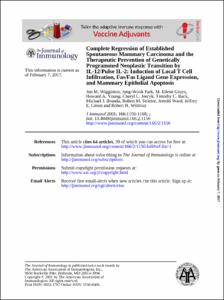Complete Regression of Established Spontaneous Mammary Carcinoma and the Therapeutic Prevention of Genetically Programmed Neoplastic Transition by IL-12/Pulse IL-2: Induction of Local T Cell Infiltration, Fas/Fas Ligand Gene Expression, and Mammary Epithelial Apoptosis
- Keimyung Author(s)
- Park, Jong Wook
- Department
- Dept. of Immunology (면역학)
- Journal Title
- journal of Immunology
- Issued Date
- 2001
- Volume
- 166
- Issue
- 2
- Abstract
- Using a novel transgenic mouse model of spontaneous mammary carcinoma, we show here that the IL-12/pulse IL-2 combination
can induce rapid and complete regression of well-established autochthonous tumor in a setting where the host immune system has
been conditioned by the full dynamic process of neoplastic progression and tumorigenesis. Further, this regimen inhibits neovascularization
of established mammary tumors, and does so in conjunction with potent local induction of genes encoding the
IFN-g- and TNF-a-inducible antiangiogenic chemokines IFN-inducible protein 10 and monokine induced by IFN-g. In contrast
to untreated juvenile C3(1)TAg mice in which histologically normal mammary epithelium predictably undergoes progressive
hyperplasia, atypical changes, and ultimately transition to overt carcinoma, the current studies also demonstrate a unique preventative
therapeutic role for IL-12/pulse IL-2. In juvenile mice, early administration of IL-12/pulse IL-2 markedly limits the
expected genetically programmed neoplastic transition within the mammary epithelium and does so in conjunction with enhancement
of constitutive Fas and pronounced induction of local Fas ligand gene expression, T cell infiltration, and induction of
apoptosis within the mammary epithelium. These events occur in the absence of a durable Ag-specific memory response. Thus, this
novel model system demonstrates that the potent therapeutic activity of the IL-12/pulse IL-2 combination rapidly engages potent
apoptotic and antiangiogenic mechanisms that remain active during the delivery of IL-12/pulse IL-2. The results also demonstrate
that these mechanisms are active against established tumor as well as developing preneoplastic lesions.
- Keimyung Author(s)(Kor)
- 박종욱
- Publisher
- School of Medicine
- Citation
- Jon M. Wigginton et al. (2001). Complete Regression of Established Spontaneous Mammary Carcinoma and the Therapeutic Prevention of Genetically Programmed Neoplastic Transition by IL-12/Pulse IL-2: Induction of Local T Cell Infiltration, Fas/Fas Ligand Gene Expression, and Mammary Epithelial Apoptosis. journal of Immunology, 166(2), 1156–1168. doi: 10.4049/jimmunol.166.2.1156
- Type
- Article
- ISSN
- 0022-1767
- Appears in Collections:
- 1. School of Medicine (의과대학) > Dept. of Immunology (면역학)
- 파일 목록
-
-
Download
 oak-aaa-4508.pdf
기타 데이터 / 4.84 MB / Adobe PDF
oak-aaa-4508.pdf
기타 데이터 / 4.84 MB / Adobe PDF
-
Items in Repository are protected by copyright, with all rights reserved, unless otherwise indicated.